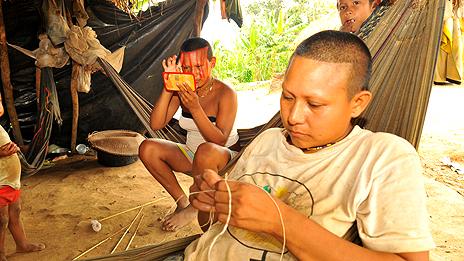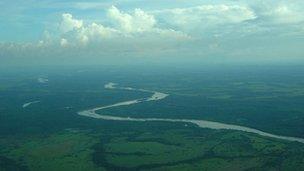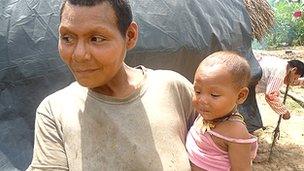Nukak dispossession highlights Amazonian tribes' plight
- Published

Nukak youngsters are caught between the twin pressures of tradition and modernity
Slumped in a hammock, Duki Maku glares aggressively from behind dark sunglasses as he outlines the Nukak people's claims to a life beyond the tangle of the southern Colombian jungles.
"The Nukak want out," he says angrily, "the Nukak no longer belong in the jungle."
Village elders look on, a collective concern flashing across their faces as they recognise Duki's familiar rant.
Duki - otherwise known as Esneider, his preferred non-Nukak name - and a few other younger Nukak unfamiliar with the jungle want modernity.
The rest long to return to their ancestral grounds near to the Cano Grande, a waterway flowing between the key rivers of the Inirida and Guaviare, which eventually empties into the mighty Amazon.
It is an area of untold biodiversity and the Nukak Maku, a traditional nomadic hunter gatherer tribe, possess a profound understanding of the jungle, and of the plants and animals in it.
But the Cano Grande area is also plagued by all of the scourges found in contemporary Colombia.
Coca fumigation, increased military pressure on areas held by Farc (Revolutionary Armed Forces of Colombia) rebels, and former President Alvaro Uribe's security policies have led to a long-running conflict striking at the very heart of traditional Nukak territory.
Displacement camp
For now, Duki and his relatives live far from their traditional lands on the outskirts of the departmental capital, San Jose del Guaviare, about 280km (173 miles) from the capital Bogota.
They reside in Aguabonita, a displacement camp set up specifically for the Nukak, just a stone's throw from the military bases whose helicopter gunships offer a constant reminder of the situation in this part of Colombia.

The Nukak's traditional homeland is an area of extraordinary biodiversity
According to Nukak expert and anthropologist Dany Mahecha, the tribe's displacement has "made the Nukak people the clearest expression of the armed conflict in Colombia".
And, displaced as they are, the Nukak are now being subjected to cultural, technological, biological and environmental pressure exerted by Colombian society.
The Nukak are beyond the crossroads in their existence - a situation illustrated by disenfranchised and confused youngsters like Duki, dressed in a dark T-shirt and jeans, standing alongside family members in traditional loincloths.
But there is far more at stake than just the plight of the last remaining nomadic tribe in this part of Colombia.
The Nukak Maku, currently numbering just 580 to 600 individuals after their population fell by 65% from 1988-1998, are rapidly coming to represent the plight of all of Colombia's indigenous tribes.
Giovanni Lepri, of the UN refugee agency Acnur in Villavicencio, says that the Nukak have become the public face of the indigenous struggle in this region since a group of almost 80 of them joined wider Colombian society in Guaviare in 2003, but he points out that they are not alone.
"The situation of the Nukak is not singular, the Jiw and Sicuani tribes here suffer the same fate and they are all at risk of extinction, yet there is no institutional push to help as no government body knows exactly what to do," he says.
Anthropologists such as Mr Mahecha and workers at Accion Social, the central government's emergency aid organisation, say that measures put in place to try to help the Nukak have not been adequate.
The food distributed by the government, rice, beans, plantains and so on - staples in other regions of Colombia - was completely foreign to the Nukak.
Threat of disease
It has also been noted by social workers that the Nukak are particularly prone to soil-transmitted diseases and impurities in their water sources so in a region under duress from coca fumigation, the Nukak have arrived with various other health complaints.

The Nukak Maku, currently numbering just 580 to 600 individuals
And due to their isolation until the 1980s, the Nukak have an immune system which struggles to combat influenza and the common cold, and tuberculosis is a death sentence.
Illnesses aside, according to Dr Sanchez of Bienestar Familiar, Colombian welfare services, it is the complete about-turn in the Nukak lifestyle that is the biggest concern.
"The Nukak are in a period of accelerated transition from an egalitarian society to that of capitalism," he said.
But simply returning the Nukak to the jungle is not an option. "There is an enormous military presence in the area which renders social work an impossibility," Mr Mahecha says.
And there is the possibility of Nukak being killed by Farc rebels who accuse them of colluding with the government - given their nomadic habits, they are believed to act as informants for the government - or of them being exploited as coca pickers for illegal groups as has been reported in the past.
But in the meantime, Duki "Esneider" Maku, like other members of Colombia's marginalized indigenous peoples continues to struggle for identity as a member of an abstract citizenry.